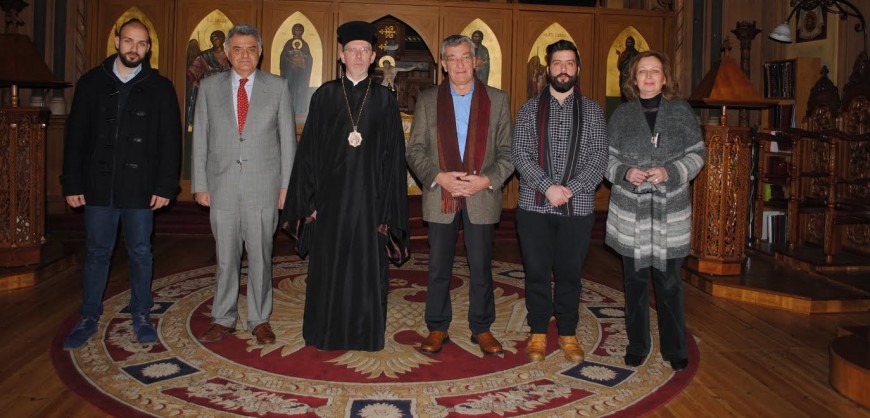 The mayors of Lesbos, Greece Mr. Spyridon Galinos and Lampedusa, Italy Ms. Giusi Nicolini were honored with the 2016 Olof Palme Prize at a ceremony held at Sweden’s national legislature, the Riksdag. In attendance were the ambassadors of Greece and Cyprus, Dimitrios Touloupas and Andreas Kakouris, Metropolitan Cleopas of Sweden and All Scandinavia, the widow of the late Olof Palme, who bestowed the prizes, and numerous public figures from the country’s political circles. This year, the Olof Palme Foundation awarded the courage, sacrifices, and humanitarianism displayed by the two mayors and the residents of their respective islands towards the thousands of refugees arriving there.
The mayors of Lesbos, Greece Mr. Spyridon Galinos and Lampedusa, Italy Ms. Giusi Nicolini were honored with the 2016 Olof Palme Prize at a ceremony held at Sweden’s national legislature, the Riksdag. In attendance were the ambassadors of Greece and Cyprus, Dimitrios Touloupas and Andreas Kakouris, Metropolitan Cleopas of Sweden and All Scandinavia, the widow of the late Olof Palme, who bestowed the prizes, and numerous public figures from the country’s political circles. This year, the Olof Palme Foundation awarded the courage, sacrifices, and humanitarianism displayed by the two mayors and the residents of their respective islands towards the thousands of refugees arriving there.
“The name of Lesbos has become commonplace to people from all over the world, who see an outpouring of humanitarianism and solidarity in its example, as well as the society envisioned by Olof Palme. My fellow citizens are doing their humanitarian duty as they handle an enormous humanitarian crisis in an exemplary manner; a crisis that has left the international community stunned as it discovers the real proportions of the problem,” Mr. Galinos noted in his speech.
At the end of the ceremony, Metropolitan Cleopas congratulated Mayor Galinos and invited him to visit the headquarters of the Holy Metropolis of Sweden in Stockholm. Their meeting took place on the afternoon of Tuesday, January 31, 2017, at the St. George Cathedral. The Ambassador of Greece Dimitrios Touloupas accompanied Mayor Galinos to this meeting, along with the latter’s wife, his son Michael-Mimis Galinos, and his associate Marios Andriotis.
The meeting began with a tour of the Cathedral, where the visitors were informed about the church’s rich and longstanding history, as well as the present efforts to renovate the edifice.
In the discussions that followed, Mayor Galinos informed Metropolitan Cleopas about the present state of the island of Lesbos, as well as the problems and challenges that local governance is managing daily as a result of the large number of refugees that they are called to host.
In his conversation with Mayor Galinos, Metropolitan Cleopas reiterated the firm position of the Church, which has stood on the front lines of the effort to provide humanitarian aid to the refugees with all its resources right from the onset of the crisis, thus substantially aiding Greek state agencies. He also made special reference to the recent visit by His All Holiness Ecumenical Patriarch Bartholomew, His Beatitude Archbishop Ieronymos of Athens and All Greece, and His Holiness Pope Francis to the refugee camp at Moria, highlighting the great symbolism of their meeting there. In addition, the Metropolitan cited the work of the Rev. Christopher Schuff, an Orthodox clergyman from the USA serving in Norway who is known for his volunteerism and organizational abilities, and who regularly visits Lesbos at his own expense to stand by the refugees.
At the conclusion of their discussion, Metropolitan Cleopas thanked Mayor Galinos for honoring the Ecumenical Patriarch’s historic eparchy in Scandinavia with his presence and offered him a copy of his study on St. Nectarios’ ministry at the Rizareios Seminary, as a token of his appreciation. The meeting ended with the Metropolitan expressing his wishes to the mayor for a safe return, continued success in the difficult task he has undertaken, and the assurance that he will keep him in his prayers.
Blog
-
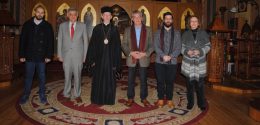
Metropolitan Cleopas of Sweden attends feting of Lesbos Mayor with the Olof Palme Prize
-

“GR80s”: get to know the Greece of the’80s through an exhibition!
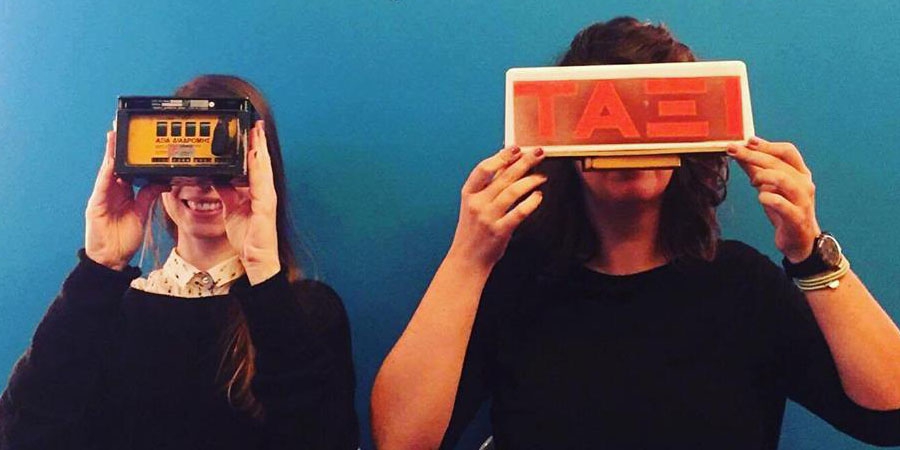 The first major participatory exhibition in Greece is a fact, and it is about the 1980s. Besides, it is bilingual and, therefore, particularly friendly to foreign visitors of the city too. Photos, clothes, all kinds of souvenirs and memorabilia, toys, pieces of furniture, audiovisual records and anything you can imagine will be among the exhibits on the exhibition called “GR80s. The Greece of the Eighties at the Technopolis”, which is to open on 25 January. Until March, the exhibition that is hosted in the old industrial gas facilities in Athens will revive the history, the culture and the atmosphere of the ’80s, in a partnership between the “Technopolis of the City of Athens” and the “Onassis Cultural Centre”. The public and private life during the decade will be recomposed through 4,000 interactive exhibits, four subject areas, 13 kiosks, rare photos, extensive audio-visual material and more than 30 parallel events. The result is expected to be very realistic since a large part of the exhibits came from volunteers who lent authentic objects of the decade for the exhibition.
The first major participatory exhibition in Greece is a fact, and it is about the 1980s. Besides, it is bilingual and, therefore, particularly friendly to foreign visitors of the city too. Photos, clothes, all kinds of souvenirs and memorabilia, toys, pieces of furniture, audiovisual records and anything you can imagine will be among the exhibits on the exhibition called “GR80s. The Greece of the Eighties at the Technopolis”, which is to open on 25 January. Until March, the exhibition that is hosted in the old industrial gas facilities in Athens will revive the history, the culture and the atmosphere of the ’80s, in a partnership between the “Technopolis of the City of Athens” and the “Onassis Cultural Centre”. The public and private life during the decade will be recomposed through 4,000 interactive exhibits, four subject areas, 13 kiosks, rare photos, extensive audio-visual material and more than 30 parallel events. The result is expected to be very realistic since a large part of the exhibits came from volunteers who lent authentic objects of the decade for the exhibition. -

Culture capital celebrations get underway in Paphos
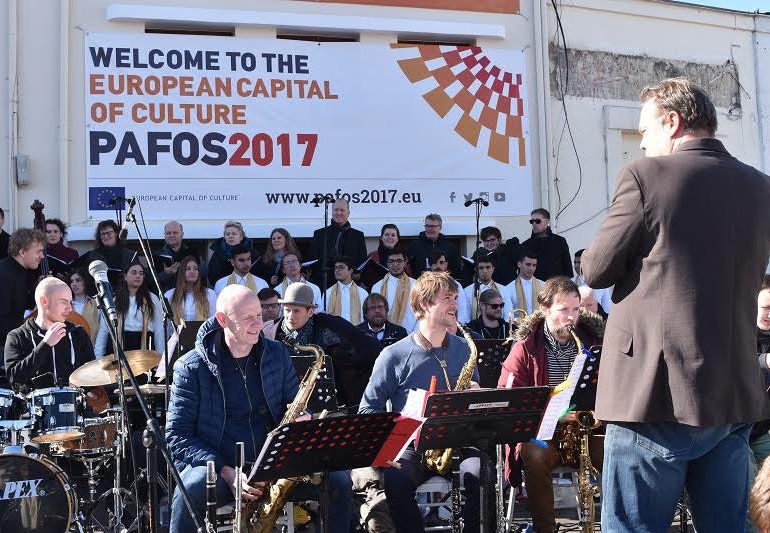 CELEBRATIONS to mark the official opening of Pafos2017 got underway in the town on Saturday ahead of the main event later in the evening.
CELEBRATIONS to mark the official opening of Pafos2017 got underway in the town on Saturday ahead of the main event later in the evening.A number of free events are being held in Paphos over the weekend to mark the occasion.
Excitement is mounting in the town and the buoyant mood was further lifted by a superb performance from the Aarhus Jazz Orchestra at Kennedy Square in the heart of Paphos old town which was scheduled to start at 12 noon.
Crowds gathered as the sun shone, braving a biting cold wind, to enjoy the hour long performance which also featured the Concert Clemens Choir and the Music Lyceum of Paphos Choir.
The musical offering got off to a late start due to a technical sound issue which was resolved during the performance, but which didn’t manage to dampen the spirits of the performers or the audience.
Cypriots, ex pat residents of all nationalities and visitors also enjoyed complimentary local wine and zivania.
Aarhus and Paphos, the two European Capitals of Culture for 2017, will be connected throughout the year by a series of common projects and actions, of which this performance is the first.
The work of the internationally renowned Danish composer, Lars Møller, was composed specifically for the opening event of the European Capital of Culture – Aarhus2017. He was in Paphos to present his work with the Aarhus Jazz Orchestra, the Concert Clemens Choir and the Music Lyceum of Paphos choir.
The Paphos choir also performed at the Aarhus cultural capital opening celebrations in Denmark last weekend.
The Aarhus Jazz Orchestra is conducted by Lars Møller, the Concert Clemens Choir by an energetic conducted Carsten Seyer Hansen.
At the end of the concert, crowds were reminded to show their support and attend the main event later in Paphos which gets underway in the newly revamped town hall square at 7pm.A walk around the city and the main venues of the Pafos2017 European Capital of Culture also got underway at 10am. Information points and volunteers provided information to the public.
Five recitals from five soloists, musicians and singers, performing works from the classical and the modern repertoire started at 10.45am at Vintage Art Café, Ananas 8Bit Coffee, Deloubak Espresso Cuisine Co, Beanhaus Coffee Roasters and Let them Eat Cake.
Free parking for the weekend’s events will be available at a number of places including: Karavella, the new public parking behind the old police station, the 7th Elementary school stadium, Iakoveio Gymnastirio [Korinos] and underground parking at the government buildings.
-
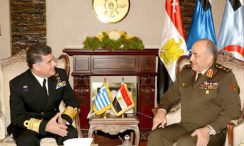
Egyptian army chief of staff discusses military cooperation with Greece’s navy chief
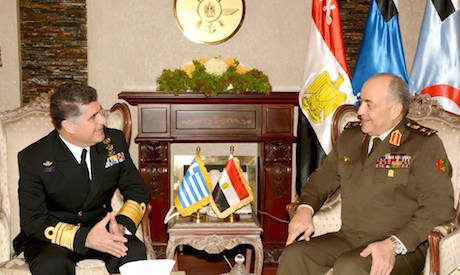 Egypt’s army Chief of Staff Mahmoud Hegazi met on Monday in Cairo with the Chief of Greece’s Navy General Staff Nikolaos Tsounis for talks over means of expanding joint military cooperation, a statement by the Egyptian Armed Forces read.
Egypt’s army Chief of Staff Mahmoud Hegazi met on Monday in Cairo with the Chief of Greece’s Navy General Staff Nikolaos Tsounis for talks over means of expanding joint military cooperation, a statement by the Egyptian Armed Forces read.Egyptian army spokesman Tamer El-Rifaei said that the talks involved several issues of common interest, including an exchange of viewpoints towards developments taking place in the MENA region and their impact on the regional and international arenas.
Hejazi affirmed the depth of the ongoing partnership and cooperation between the Egyptian and Greek armed forces to support the efforts of security and stability in the Middle East.
Egyptian and Greek Armed Forces concluded in December the Medusa 2016 joint military drills in Greece.
During the training, Egyptian air and naval forces participated in the drills with Greek forces, which were held in the southeastern Aegean Sea and on the island of Crete.
-
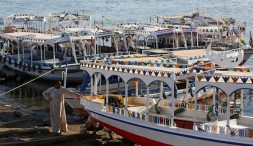
Egypt sets up new fund to revive tourism industry
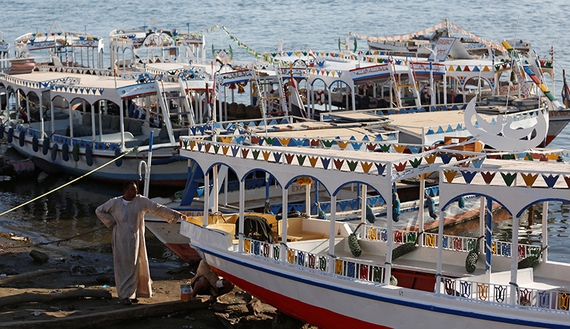 Egypt has set up a new fund worth 5 billion Egyptian pounds ($267 million) to upgrade hotels, tourist resorts and Nile floating boats across the country as part of efforts to revive its ailing tourism industry.
Egypt has set up a new fund worth 5 billion Egyptian pounds ($267 million) to upgrade hotels, tourist resorts and Nile floating boats across the country as part of efforts to revive its ailing tourism industry.The new fund, which was announced by the Central Bank of Egypt (CBE) on Dec. 26, would finance maintenance and upgrades at hotels, tourist resorts and other tourism facilities with an interest rate of 10%. The CBE also decided to extend the grace period for tourism investors to pay their debts until 2018.
Funds would also be offered to investors in accordance with a set of rules, including the investor’s level of seriousness and the benefits that will increase tourism flow to the country.
The new measures came after a meeting between Central Bank Governor Tarek Amer and tourism investors in South Sinai during which perils of investment in the tourism sector were discussed. During the meeting, Amer promised to solve the problems Egyptian investors face in the tourism industry in order to give a push to the staggering sector.
According to data released by the Ministry of Tourism, Egypt incurred monthly losses of 3.2 billion Egyptian pounds ($170 million) directly and indirectly after the downing of a Russian plane in the Sinai Peninsula in October 2015. Following the deadly incident, a number of foreign countries, including Russia, the UK and Germany, imposed travel bans on flights to the Red Sea resort town of Sharm el-Sheikh.
Tourism experts say the new fund is an ambitious step to reinvigorate hotels that have not undergone maintenance and upgrades for six years as well as help them serve the expected return of tourism and travel flow to Egypt.
“The new fund would enable hotels and tourist resorts to well receive tourist arrivals, which are forecast to increase in the coming period,” Hossam Akawy, a tourism expert and a member of the Tourism Investors’ Association in the Red Sea, told Al-Monitor.
Germany, Denmark and Finland lifted their travel bans on flights to Egypt’s Sharm el-Sheikh last year.
Akawy said that there are widespread expectations that the tourism industry would be back on its feet this year. “That is why hotels and tourist facilities need to get a face-lift,” he added.
Russian Transport Minister Maxim Sokolov said last week that Russia would likely resume direct flights with Egypt in January, according to Russia’s TASS news agency. Sokolov added that the decision to resume flights will be made after Russian officials revise reports by Russian experts who have assessed Egyptian airport security. Since the Russian plane crash, Egypt has been putting in place tighter security measures at all its airports in order to draw tourists back to the North African country.
In a phone conversation with Egyptian President Abdel Fattah al-Sisi late last month, Russian President Vladimir Putin said that his country intends to resume flights with Cairo in the very near future.
Akawy said that the setting up of the fund came as a lifebuoy for owners of hotels and tourist resorts in the country, as banks had stopped funding the tourism sector due to instability and financing risks.
In March 2016, the Egyptian Ministry of Tourism announced it would not allow the establishment of more tourism companies for a year due to declining tourism flow.
Adel Salah Nagi, another tourism expert, said that the new fund is a positive move. However, he added that it should have included support to other aspects of the whole tourism system, including marketing and tour operators. “Tourism is not only about hotels. There are other areas that also need to be upgraded and developed, especially marketing and tour operators,” he told Al-Monitor.
Nagi said that the government also has to further facilitate travel measures for tourists and launch direct flights with countries that Egypt is not directly connected with. He called upon the authorities to cancel the entry visa fees. On-arrival visa fees are estimated at $25.
Tourism has long been a main contributor to the national income. Before the January 25 Revolution in 2011, one in 10 people in the workforce worked in the tourism sector and it generated approximately $12.5 billion in revenue.
At its peak, Egypt boasted nearly 15 million tourists a year. By 2013, tourism numbers had fallen by one-third to under 10 million a year and have undoubtedly slumped further since as the 2015 downing of the Russian jet that had taken off from Sharm el-Sheikh prompted foreign holidaymakers to book their vacations elsewhere.
However, experts are upbeat about the outlook of Egypt’s tourism industry in 2017. According to data released by the Central Agency for Public Mobilization and Statistics, tourist arrivals jumped by 7% in October 2016 compared with a month earlier.
Minister of Tourism Yehia Rashed said that 2017 would see a massive recovery in the Egyptian tourism sector as foreign airlines from the major markets, including Russia, the UK and Germany, are expected to resume flights to Egypt’s tourist attractions.
Tourism revenues from those three markets, the minister added, represented more than 40% of the total tourism flow to Egypt in recent seasons.
According to the Tourism Ministry data, Egypt attracted about 5.3 million tourists by the end of 2016 despite ongoing challenges.
(www.al-monitor.com) -

On Cue With Elon Musk, A Solar Power Company Blooms In The Egyptian Desert
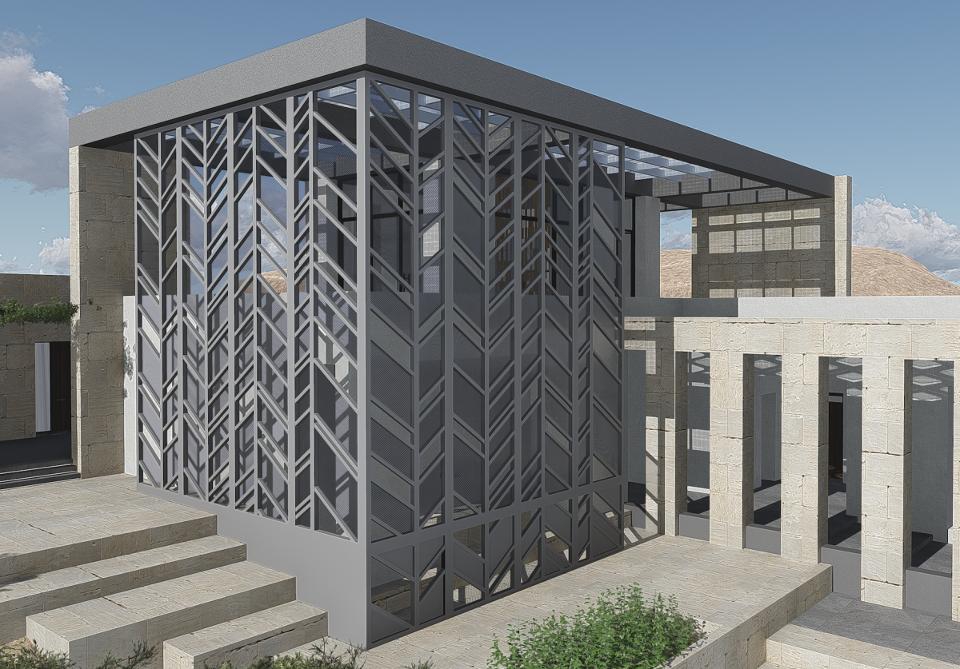 CAIRO—About a half-million solar panels were installed every day around the world last year, according to the International Energy Agency. Costs for solar photovoltaics are expected to drop by 25% by 2020, making solar — already competitive — cheaper than other forms of energy in many cases.
CAIRO—About a half-million solar panels were installed every day around the world last year, according to the International Energy Agency. Costs for solar photovoltaics are expected to drop by 25% by 2020, making solar — already competitive — cheaper than other forms of energy in many cases.Smart entrepreneurs will get ahead of that curve. In Cairo, I met the CEO and chief architect of a company, Karm Solar, that has been in the forefront of solar since 2011 — back when solar was in the doldrums. I first read about Karm Solar in Startup Rising, a book by U.S.-based venture investor Christopher M. Schroeder.
Karm Solar has come a long way since then. Now that the company has recurring revenue that comes from its construction of solar power stations and sale of the power, Ahmed Zahran said he expects the company to be profitable this year. It’s the only company in Egypt with a license to do those installations; Karm then sells power to businesses. It also leases solar power installations, working with EFF Hermes Leasing to set up financing for customers.
Karm Solar, which now has 52 employees, aims to raise $70 million from institutional investors this year. It’s a model of one method of scaling up: by diversification.
Back in 2011, Ahmed Zahran, 36, couldn’t get his employer to invest in his idea for solar-powered water pumps. They seemed a no-brainer to him in the Egyptian desert, where there is a lot of water under the ground and plenty of sunshine on top of it.
So he and about half a dozen co-founders, raised money from 20 angels, in increments ranging from $10,000 to $1 million. They looked for people who could give them advice as well as cash.
“There is a gold mine of young professionals here,” said Zahran.
The upshot of the advice and cash is that Karm Solar is now building a company for the long term, one that focuses on innovations and technology in the solar market. “In Germany, you have Siemens, in the United States your have General Electric, developing technologies, developing infrastructure,” he said.
-

Critical film unnerves Egypt’s religious scholars
 Egypt’s religious scholars are up in arms over a new film that takes on the nation’s sheikhs and mosque preachers.
Egypt’s religious scholars are up in arms over a new film that takes on the nation’s sheikhs and mosque preachers.The film, called “Mawlana” (“Preacher”), has been screened at cinemas nationwide since Jan. 4. It has stirred up controversy among Islamic scholars who accuse its makers of tarnishing their reputation and call for it to be pulled from theaters.
“Works that address religious texts should be reviewed by religious institutions before being made into films,”Shoukri el-Guindi, a member of the parliament’s Religious Affairs Committee, wrote on Facebook. “Inside these institutions, there are wise people who love their religion and their homeland, not ones who only follow their personal interests.”
He said religious scholars should not be turned into film characters and that their sanctity must be respected, asking, “Will the public follow these religious scholars if they are portrayed as lustful figures … and hypocrites?”
Starring Amr Saad and Dorra Zarrouk, the film tells the story of a mosque imam who becomes a celebrity TV host who issues fatwas followed by millions of people. The imam receives questions from his viewers during the show and then answers them in an eloquent but sarcastic manner. He ridicules a number of the fatwas issued in real life by a large number of Egypt’s Salafist preachers, especially during the yearlong rule of Islamist President Mohammed Morsi.
The filmmakers say it tells the story of Egypt’s 120,000 mosque imams. The work is based on a novel written by Ibrahim Essa, a journalist and TV host who recently ran afoul of the government for his continual criticism. The novel, also called “Mawlana,” was shortlisted for the International Prize for Arabic Fiction, the “Arabic Booker,” in 2012.
The film is being screened at more than 60 movie theaters across Egypt. So far, it has taken in 6 million Egyptian pounds ($318,000).
However, some people say the film aims to strip reverence and respect from Islamic scholars.
“It is made with the sole aim of removing this reverence and respect from the scholars of Al-Azhar,” Mansour Mandour, a senior official from the Religious Endowments Ministry, which controls the nation’s mosques, wrote on Facebook. Nonetheless, Mandour added, the film shows how security agencies tried to control some sheikhs and used their vulnerabilities to force them to serve their interests during the reign of former President Hosni Mubarak.
The film coincides with calls for Al-Azhar and other Egyptian religious institutions to spearhead the reform of religious discourse, made in the past two years by President Abdel Fattah al-Sisi, who believes that the move will help his country fight religious extremism and terrorism.
“Renewing religious discourse must, however, preserve the values of true Islam, but also eliminate sectarianism and address extremism and militancy,” Sisi said in a 2015 speech at Al-Azhar.
A large number of nationally minded writers have joined him. Some of these writers tend to criticize Al-Azhar’s curricula, accusing it of nurturing extremism.
Essa is one of these writers. He believes that reform should not be the job of Al-Azhar alone, but of all Egyptians, including the intellectuals.
Essa is out of the TV business now after his show was banned. Some people say he paid dearly for speaking out.
“Mawlana,” he said, brings to light the contradictions in the mosque-preaching business.
The film’s director Magdi Ahmed Ali said most of those who criticized the film were motivated by their hatred of Essa, not by faults they found in the film. “I didn’t find any real criticism of the film,” Ali told Al-Monitor. “I only heard views critical of Essa himself and his views.” He said some people had criticized the film without even watching it.
The film, Ali said, sheds light on extremism and tries to show a lack of connection between it and the Islamic religion itself. He described this extremism as a “real danger” facing Egyptian society. “The film also shows that religion is sometimes misused by politicians,” Ali said. “Anyway, the people who watched the film understand its message.”
Ali, who also wrote its script, reported receiving phone calls from a large number of the nation’s well-known preachers to congratulate him on the film’s success.
Leading film critic Magda Khiralla praised “Mawlana,” saying it should be viewed as a work of art, not as a platform for issuing fatwas.
“The film only talks about moderate Islam through the character of a young yet open-minded sheikh who tries to shatter misconceptions about the Islamic religion through logical dialogue,” she told Al-Monitor. “Controversy over the film is expected only from those who view themselves as angels and persons without fault.”
(CENTRE for RELIGIOUS PLURALISM in the MIDDLE EAST)
-
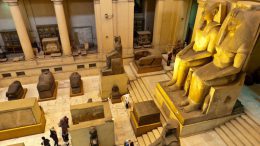
Egyptian museums achieve revenues of EGP 45m in 2016
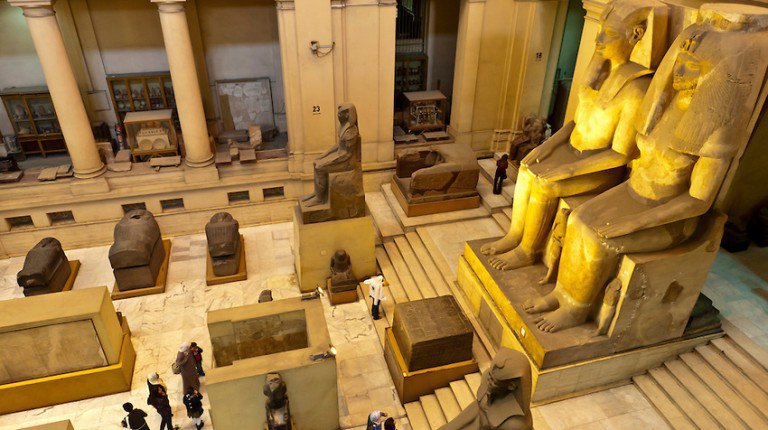 The Ministry of Antiquities’ affiliated museums have achieved total revenues of $45m with 974,400 visitors in 2016.
The Ministry of Antiquities’ affiliated museums have achieved total revenues of $45m with 974,400 visitors in 2016.According to a statement by the ministry’s museums division, the museums achieved the highest revenues in December, recording EGP 6.8m with 117,000 visitors, while the lowest revenue reached was $1.7m in June with 21,800 visitors.
Minister of Antiquities Khaled El-Anany told Daily News Egypt that the number of visits of museums and archaeological sites has increased during the recent months starting from October which coincide with the winter season, when the tourist flow increases in Egypt.
The museums’ total revenue in January reached EGP 2.8m with 72,400 visitors, compared to EGP 4m in February with 125,000 visitors.
The museums’ total revenue in March recorded EGP 3.6m with about 111,700 visitors, compared to EGP 3.5m with 68,000 visitors.
The revenues declined gradually, to record EGP 2.9m in May with 51,600 visitors, until they dropped to EGP 1.7m in June with 21,800 visitors.
The museums’ revenues in July were EGP 2.8m with about 84,000 visitors, and EGP 3m in August with 80,000 visitors.
The museums’ total revenue in September recorded EGP 3m with about 76,000 visitors, compared to EGP 4.2m in October with 70,900 visitors.
The revenues jumped in November recording EGP 5.7m with 94,700 visitors, and continued its growth to EGP 6.8m in December with a total of 117,000 visitors.
The number of the museums affiliated to the Ministry of Antiquities is 31 across the country, including 21 open-air museums and eight under-development museums, as well as two closed museums.
The closed museums are El-Arish and Beni Suef museums, while the ministry is still developing the Greek Roman museum, the Port Said museum, the Ahmed Orabi museum, the Tanta museum, the museum of Tanis, Rommel Cave museum, Mohamed Ali museum in Shubra, and the Royal Vehicles museum in Bulaq.
The ministry has opened three museums in the second half of 2016 after finishing their development, including Farouk Corner museum, which was opened in August; Mallawi museum, opened in September; and Kom Oshim museum, opened in November.
-

EU Parliament chief tweets about Alexander the Great’s heritage
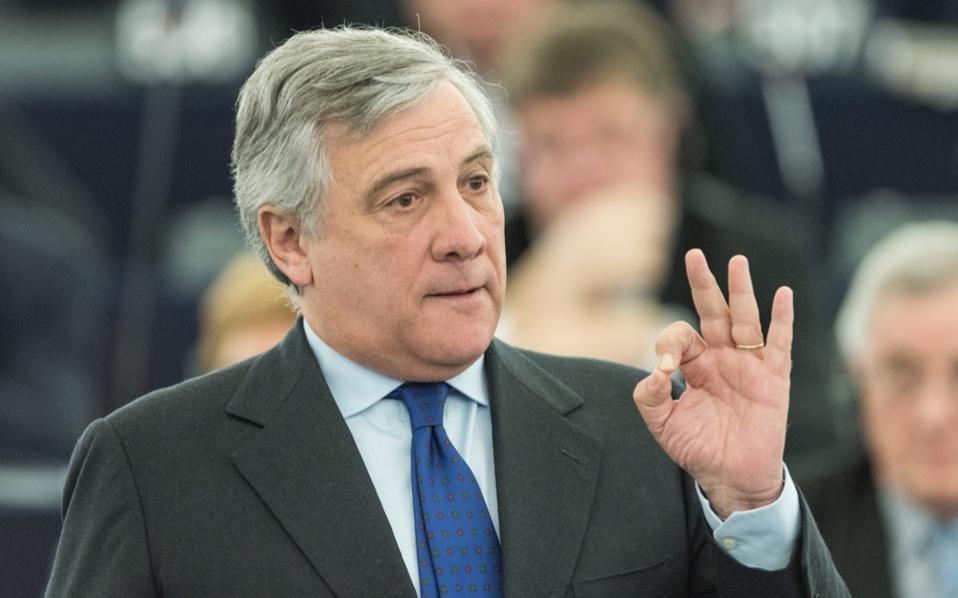 European Parliament President Antonio Tajani sought on Thursday, with a tweet written in Greek, to set the record straight with regard to comments he made last year about the ethnicity of Alexander the Great and his father, Philip II of Macedon.
European Parliament President Antonio Tajani sought on Thursday, with a tweet written in Greek, to set the record straight with regard to comments he made last year about the ethnicity of Alexander the Great and his father, Philip II of Macedon.“I know my history very well. Alexander the Great was Greek and his ideas contributed to the birth of Europe,” he tweeted.
Tajani had kicked up a storm last February saying, during a visit to the Former Yugoslav Republic of Macedonia (FYROM), that Alexander and Philip were very popular “ancestors” of the country’s Slavic population. Greece and FYROM are locked in a decades-old name dispute.
-

French Total preparing to drill off Cyprus for natural gas, says ministry source
 French energy company Total is preparing to make an exploratory marine drilling off Cyprus, a Ministry of Commerce and Energy source said on Saturday.
French energy company Total is preparing to make an exploratory marine drilling off Cyprus, a Ministry of Commerce and Energy source said on Saturday.Total, along with Italy’s ENI and Exxon Mobil, was awarded licenses for hydrocarbons exploration by Cyprus last month.
The ministry source said Total plans to drill in block 11 of Cyprus’ exclusive economic zone, which shares a boundary to the south with the giant Egyptian Zohr natural gas well, the largest ever field discovered in the eastern Mediterranean.
“We do not know yet when the drill will start, but we were notified that it will be soon,” the source said.
The Zohr discovery by ENI reinvigorated interest in the eastern Mediterranean natural gas as the drilling was done in carbonate layers, whereas previous successful natural gas drilling was carried out in lime layers.
A Total official said recently that the company’s interest in Cypriot block 11 was prompted by its proximity to the Zohr discovery, estimated to contain 30 trillion cubic feet of gas.
Cypriot experts have said that block 11 sits on an undersea mountain range known as Eratosthenis, which was considered to be the source of all hydrocarbons in the eastern Mediterranean.
The news about the impending drilling comes as efforts to solve the Cyprus problem are nearing a peak, with guarantor countries Greece, Turkey and Britain joining in discussions about security arrangements.
Turkey objects to drilling by Cyprus without the active participation of Turkish Cypriots, who pulled out of the government and the state 53 years ago.
The discovery of natural gas in Cyprus’ continental shelf by United States-based Noble Energy and nearby discoveries by Israel is considered by analysts to be a factor strongly influencing Turkey’s interest in solving the Cyprus dispute.
Cyprus and Egypt signed a framework agreement last August for the transfer of natural gas discovered by Noble Energy via pipe to Egypt’s liquefaction terminals. The gas field, about 85 km off Cyprus’ southern shores, is estimated to contain 4.5 trillion cubic feet of natural gas.
Some analysts say that Turkey counts on joining in on the proceeds from the gas by offering facilities for a gas pipe through its territory to Europe.
An alternative route for the pipe is from the gas fields to Cyprus and Greece and from there to Prindisi in southern Italy.This route had originally been excluded because of the high cost involved in the project which calls for a pipe 2,000 km long, most of it on the sea bed, capable of a yearly capacity of 12 billion cubic meters of gas.
But recent revised estimates by the European Union lowered the cost to around 5 billion euros, which is considered by specialists to be a viable proposition.
The director general of the energy ministries of Israel, Cyprus, Greece and Italy are to meet in Brussels on Monday to consider plans for the project.
Their talks will prepare a meeting of the Energy Ministers of the four countries scheduled for next month in Jerusalem.